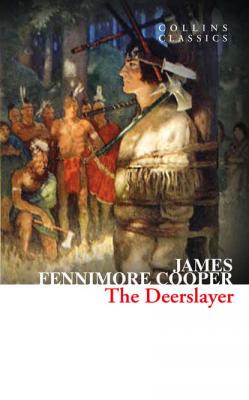The Deerslayer. Джеймс Фенимор Купер
Читать онлайн.| Название | The Deerslayer |
|---|---|
| Автор произведения | Джеймс Фенимор Купер |
| Жанр | Классическая проза |
| Серия | |
| Издательство | Классическая проза |
| Год выпуска | 0 |
| isbn | 9780007502660 |
THE DEERSLAYER
James Fenimore Cooper
Table of Contents
Classic Literature: Words and Phrases adapted from the Collins English Dictionary
In 1819, millworker William Collins from Glasgow, Scotland, set up a company for printing and publishing pamphlets, sermons, hymn books and prayer books. That company was Collins and was to mark the birth of HarperCollins Publishers as we know it today. The long tradition of Collins dictionary publishing can be traced back to the first dictionary William published in 1824, Greek and English Lexicon. Indeed, from 1840 onwards, he began to produce illustrated dictionaries and even obtained a licence to print and publish the Bible.
Soon after, William published the first Collins novel, Ready Reckoner, however it was the time of the Long Depression, where harvests were poor, prices were high, potato crops had failed and violence was erupting in Europe. As a result, many factories across the country were forced to close down and William chose to retire in 1846, partly due to the hardships he was facing.
Aged 30, William’s son, William II took over the business. A keen humanitarian with a warm heart and a generous spirit, William II was truly ‘Victorian’ in his outlook. He introduced new, up-to-date steam presses and published affordable editions of Shakespeare’s works and The Pilgrim’s Progress, making them available to the masses for the first time. A new demand for educational books meant that success came with the publication of travel books, scientific books, encyclopaedias and dictionaries. This demand to be educated led to the later publication of atlases and Collins also held the monopoly on scripture writing at the time.
In the 1860s Collins began to expand and diversify and the idea of ‘books for the millions’ was developed. Affordable editions of classical literature were published and in 1903 Collins introduced 10 titles in their Collins Handy Illustrated Pocket Novels. These proved so popular that a few years later this had increased to an output of 50 volumes, selling nearly half a million in their year of publication. In the same year, The Everyman’s Library was also instituted, with the idea of publishing an affordable library of the most important classical works, biographies, religious and philosophical treatments, plays, poems, travel and adventure. This series eclipsed all competition at the time and the introduction of paperback books in the 1950s helped to open that market and marked a high point in the industry.
HarperCollins is and has always been a champion of the classics and the current Collins Classics series follows in this tradition – publishing classical literature that is affordable and available to all. Beautifully packaged, highly collectible and intended to be reread and enjoyed at every opportunity.
The Last of the Mohicans
The first thing to note about The Last of the Mohicans is that the ‘Mohicans’ never existed. James Fenimore Cooper fused, or rather ‘confused’, the names of two real Native American tribes – the Mohegan and the Mahican – to arrive at a hybrid name. In addition, the names are plural nouns not requiring an ‘s’. Set in
